PhenomenaCritiqueLogos
PhenomenaCritiqueLogos
The Project of Critical Phenomenology
Michael Marder

London New York
Published by Rowman & Littlefield International, Ltd.
16 Carlisle Street, London, W1D 3BT
www.rowmaninternational.com
Rowman & Littlefield International, Ltd. is an affiliate of Rowman & Littlefield
4501 Forbes Boulevard, Suite 200, Lanham, Maryland 20706, USA
With additional offices in Boulder, New York, Toronto (Canada), and Plymouth (UK)
www.rowman.com
Copyright 2014 by Michael Marder
All rights reserved. No part of this book may be reproduced in any form or by any electronic or mechanical means, including information storage and retrieval systems, without written permission from the publisher, except by a reviewer who may quote passages in a review.
British Library Cataloguing in Publication Information Available
A catalogue record for this book is available from the British Library
ISBN: HB 978-1-78348-025-8
ISBN: PB 978-1-78348-026-5
Library of Congress Cataloging-in-Publication Data
Marder, Michael, 1980
Phenomenacritiquelogos : the project of critical phenomenology / Michael Marder.
pages cm
Includes bibliographical references and index.
ISBN 978-1-78348-025-8 (cloth : alk. paper) ISBN 978-1-78348-026-5 (pbk. : alk. paper) ISBN 978-1-78348-027-2 (electronic)
1. Phenomenology. I. Title.
B829.5.M333 2014
142'.7dc23
2013049228
 TM The paper used in this publication meets the minimum requirements of American National Standard for Information Sciences Permanence of Paper for Printed Library Materials, ANSI/NISO Z39.48-1992.
TM The paper used in this publication meets the minimum requirements of American National Standard for Information Sciences Permanence of Paper for Printed Library Materials, ANSI/NISO Z39.48-1992.
Printed in the United States of America
For Patrcia
Acknowledgements
Over the past few years, Ive had the privilege of discussing the ethical, political and ontological aspects of critical phenomenology with colleagues on both sides of the Atlantic. In Sweden, I benefited from comments following my presentation of The Two Phenomenologies: Of Consciousness and of Spirit, the forerunner of chapter 2, which was a part of Questioning Grounds: Contemporary Readings of German Idealism at Sdertrn University in June 2011. I am particularly grateful to Marcia S Cavalcante-Schuback for making this event possible and for her insightful feedback on my talk. In Spain, I had the opportunity to discuss key ideas from chapter 3 under the title The Ethical Ungrounding of Phenomenology at the fourth Organization of Phenomenological Organizations (OPO) World Conference, held in September 2011 in Segovia. I thank Alexandre Franco de S for his response to this text. In Portugal, I gave conference talks based on the second and third sections of chapter 1 at the first Lisbon International Conference of Philosophy and fourth International Congress for the Portuguese Association for Phenomenological Philosophy in the autumn of the same year. In March 2012, William Egginton kindly invited me to speak on the subject of critical phenomenology at Johns Hopkins University. I am likewise grateful to Aryeh Botwinick of Temple University for organising my lecture on the political phenomenology of Hannah Arendt, which contained, in nuce, the theses of chapter 4. The subsequent Q&A session provided me with helpful references to the finer points of Arendts philosophy. Sarah Campbell, at Rowman & Littlefield International, has been incredibly supportive of this project. Finally, this book is dedicated to my wife, Patrcia Vieira, who has seen PhenomenaCritiqueLogos through from the start, and whose philosophical disposition makes both love and wisdom possible.
An early version of the first part of chapter 1 was published under the title The Pulse of Phenomenology in Parrhesia 14 (2012): 1622. The Phenomenology of Ontico-Ontological Difference (Bulletin dAnalyse Phnomnologique 8, no. 2 [2012]: 120) was the foundation for chapter 2 of this book. Parts of chapter 3 appeared under the title The Ethical Ungrounding of Phenomenology: Levinass Tremors, in Being Shaken: Ontology and the Event, edited by Santiago Zabala and Michael Marder (2014). A version of chapter 4 was published as Natality, Event, Revolution: The Political Phenomenology of Hannah Arendt in Journal of the British Society for Phenomenology 44, no. 3 (October 2013): 30119. All these texts are reproduced with the permission of copyright holders.
Abbreviations of Book Titles
by E. Husserl
EU | Erfahrung und Urteil. Untersuchungen zur Genealogie der Logik, edited by L. Landgrebe (Hamburg: Meiner Verlag, 1999). |
H I | Cartesianische Meditationen und Pariser Vortrge, edited by
S. Strasser (The Hague: Martinus Nijhoff, 1950). |
H II | Die Idee der Phnomenologie. Fnf Vorlesungen, edited by
W. Biemel (The Hague: Martinus Nijhoff, 1950). |
H III | Ideen zu einer reinen Phnomenologie und phnomenologischen Philosophie. Erstes Buch: Allgemeine Einfhrung in die reine Phnomenologie, edited by W. Biemel (The Hague: Martinus Nijhoff, 1950). |
H IV | Ideen zu einer reinen Phnomenologie und phnomenologischen Philosophie. Zweites Buch: Phnomenologische Untersuchungen zur Konstitution, edited by W. Biemel (The Hague: Martinus Nijhoff, 1952). |
H VI | Die Krisis der europischen Wissenschaften und die transzedentale Phnomenologie. Eine Einleitung in die phnomenologische Philosophie, edited by W. Biemel (The Hague: Martinus Nijhoff, 1954). |
H XI | Analysen zur passive Synthesis. Aus Vorlesungs- und Forschungs-manuskripten 19181926, edited by M. Fleischer (The Hague: Martinus Nijhoff, 1966). |
H XVII | Formale und transzedentale Logik. Versuch einer Kritik der logischen Vernunft, edited by P. Janssen (The Hague: Martinus Nijhoff, 1974). |
H XVIII | Logische Untersuchungen. Band I: Prolegomena zur reinen Logik (The Hague: Martinus Nijhoff, 1975). |
H XIX/1 | Logische Untersuchungen. Band II: Untersuchungen zur Phnomenologie und Theorie der Erkenntnis. I. Teil (The Hague: Martinus Nijhoff, 1984). |
H XXVII | Aufstze und Vortrge (19221937), edited by T. Nenon and
H.-R. Sepp (Boston: Kluwer, 1989). |
* Please note that throughout this book, Husserls works published in Husserliana are cited as H, followed by the volume, in Roman numerals, and page number.
Introduction
In the Beginning Was a Critique of Logos...
Today, in the early part of the twenty-first century, phenomenology is going through an exciting makeover. Long past are the decades of its isolation from the scientific milieu: transdisciplinary investigations at the intersection of phenomenological philosophy and cognitive science, It is now undeniably more difficult to sustain a humanist prejudice (for which Martin Heidegger, in his Letter on Humanism, famously chastised Jean-Paul Sartre) within a phenomenological research program than it was in the middle of the twentieth century. If the proof of an intellectual movements vitality is that it opens new vistas for investigation, finds countless opportunities for the application of its method and does not shy away from a creative and rigorous self-reinvention, then phenomenology fully satisfies all three requirements, exhibiting the verve that other strands of contemporary philosophy will find enviable.
Next page
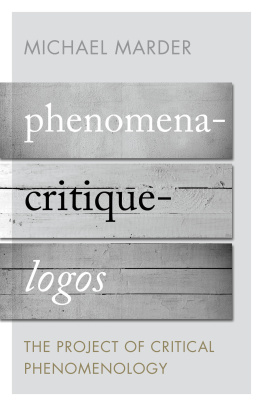



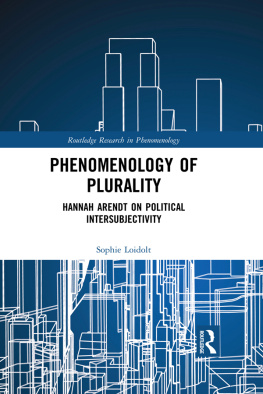
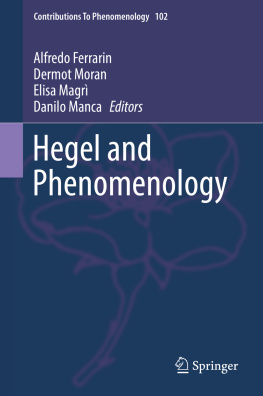
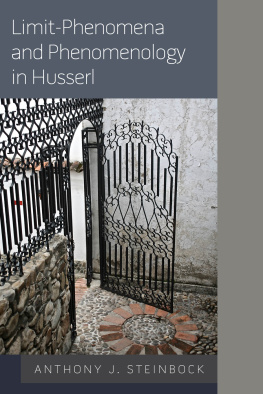
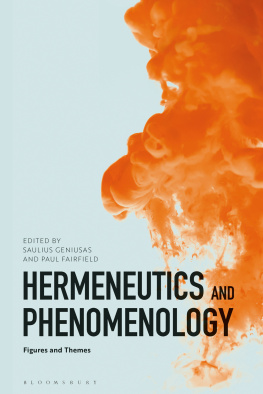
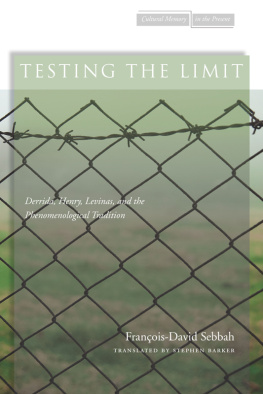
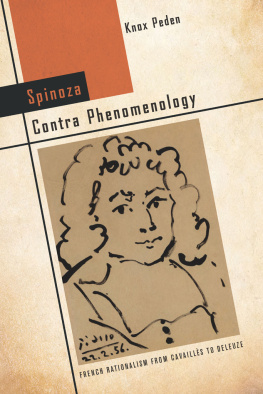
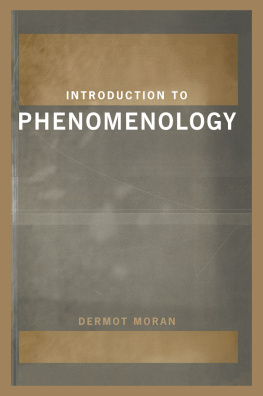
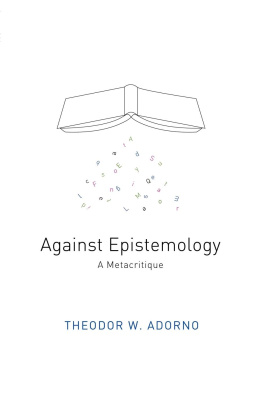

 TM The paper used in this publication meets the minimum requirements of American National Standard for Information Sciences Permanence of Paper for Printed Library Materials, ANSI/NISO Z39.48-1992.
TM The paper used in this publication meets the minimum requirements of American National Standard for Information Sciences Permanence of Paper for Printed Library Materials, ANSI/NISO Z39.48-1992.